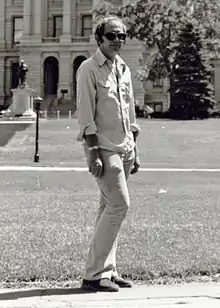Lyman Andrews
Lyman Henry Andrews (April 2, 1938 - February 13, 2009) was an American poet, and close friend of Allen Ginsberg and Robert Lowell amongst other writers with whom he maintained a lifelong contact. He also knew William S. Burroughs, in Tangiers and London.
Lyman Andrews died on Friday 13 February 2009 at his apartment in Nottingham.
Lyman Andrews | |
|---|---|
 Lyman Andrews 1979 | |
| Born | Lyman Henry Andrews April 2, 1938 Denver, Colorado |
| Died | February 13, 2009 Nottingham |
| Education | Brandeis University, graduate work at University of California Berkeley and King's College London |
| Notable works |
|
| Notable awards |
|
Life
He was born on April 2, 1938 in Denver, did his undergraduate studies at Brandeis University, where he studied with Philip Rahv, Claude Vigée and Pierre Emmanuel. He did graduate study at the University of California Berkeley and King's College London. He had four volumes of poetry published, beginning with Ash Flowers while an undergraduate, including The Death of Mayakovsky and Kaleidoscope.[1] He settled in the UK, and became poetry critic for the Sunday Times,[2] and Lecturer in American Studies at University of Leicester, from 1965 to 1988 (during which time he led a "colourful" life).[3]
He was also a defence witness for John Calder and Marion Boyars (his publishers) during the trial in 1967 bought against them by the Crown for the publication of Last Exit to Brooklyn, by Hubert Selby.[4] It was at the celebratory party afterwards when he first met Burroughs - at first mistaking him for a butler being dressed in dark suit and tie.[1]
His manuscript of Kaleidoscope is at Indiana University.[5] He lived his final years as a recluse in Nottingham.[6] Andrews left a major work Hometown (The Denver Poem), 57 parts long, which has not been published. He worked on this for the last twenty years of his life.
Awards
- Fulbright Fellowship
- James Phelan Fellowship
- Woodrow Wilson Fellowship
Bibliography
References
- http://www.interpc.fr/mapage/westernlands/reportdec04.html
- Asthana, Anushka; Sherman, Jill. "Article". The Times. London. Archived from the original on October 15, 2009.
- http://fromsheeptoalligators.blogspot.co.uk/2012/03/questioning-authority-british-and.html
- Jones, D. A. N., Peter Fryer, and C. II. Rolph [pseud. for C. R. Hewitt]. "The Trouble with Censorship." New Statesman, 72:912-13, 16 December 1966. J21
- http://www.indiana.edu/~liblilly/lilly/mss/subfile/calderbkgenscr.html
- International Who's Who in Poetry 2004. Taylor & Francis. 2004. ISBN 978-1-85743-178-0.